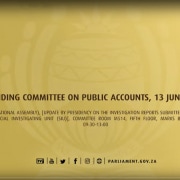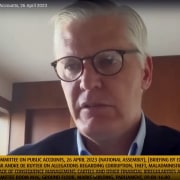|
Getting your Trinity Audio player ready...
|
By Lesedi Masoko
The R2.5-billion that remains unaccounted for in the National Skills Fund (NSF) is a severe setback for South Africa’s young people, many of whom rely on government support for the chance to further their studies and careers. The NSF provides funding for skills development initiatives that are identified by the National Skills Development Plan 2030 as national priorities, are related to the achievement of the Skills Development Act 97 of 1998, or considered to be an activity undertaken by the minister of higher education and training to achieve a standard of good practice in terms of skills development.
Scopa had ordered the investigations back in May 2021, after receiving a second consecutive Auditor-General (AG) report showing that the money could not be traced.
Higher Education and Training minister Blade Nzimande recently came under fire before the parliamentary Standing Committee of Public Accounts (Scopa), which called him in on 13 September 2022 to update it on the progress of forensic investigations into the missing money. This particular meeting was the result of a last-minute postponement by Nzimande two weeks before, which greatly displeased the Scopa committee.
The AG report also resulted in the suspension in 2021 of the department’s former DG Gwebinkundla Qonde and former CEO Mvuyisi Macikama.
Delaying tactics?
The committee had asked Nzimande to use the Special Investigating Unit (SIU) to conduct the investigation, but the minister preferred his own choice, a private company named Nexus, though he did commit to working closely with the SIU.
Committee members heard that the report was completed in March 2022, but had been held back by the department. Nzimande’s explanation was that he was acting on “internal legal advice” to not share the report because of the “sensitivity of making public the names of implicated NSF officials or service providers appearing in the report.”
Scopa rejected this explanation for the seven-month delay, and directed the Department of Higher Education and Training to furnish it with the report within 10 days. In its quest to ensure accountability for malfeasance, the committee was adamant it could not fully engage with the matter without access to the report.
“Once we have received the report, we will consider it accordingly. We have got a vested interest in that report because the investigation arose out of disclaimers, which were of very serious concern to us,” said Scopa chairperson Mkhuleko Hlengwa.
In a later meeting held on 27 September, Hlengwa confirmed that he had finally received the report – as well as a request from Nzimande the day before, asking that the report remain confidential.
This request was made on the basis that “people whose names are mentioned in the report have not been engaged at all, whilst the department is still finalising its internal processes.”
The committee deliberated on the matter and came to the conclusion that Nzimande’s request was not convincing enough to apply Parliament’s Rule 189, which deals with the publication or disclosure of proceedings, evidence, reports, and more. The committee also felt that in the interest of transparency, a report into the mismanagement of public funds could not be held in confidence. It therefore unanimously dismissed Nzimande’s request during a follow-up meeting on 28 September.
Consequence management
On 25 August 2021, Nzimande briefed the committee on previous consequence management processes and corrective actions taken on the allegations regarding the NSF.
The committee heard that as a result of the AG’s damning reports, the entity’s former DG Qonde had been suspended on 23 July 2021, and his contract ended on 6 September 2021. In addition, former CEO Macikama was placed on precautionary suspension on 1 August 2021 but resigned on 30 June this year.








